新目标2023年中考一轮教材复习 课件七年级下册 Units 7-9
文档属性
| 名称 | 新目标2023年中考一轮教材复习 课件七年级下册 Units 7-9 | 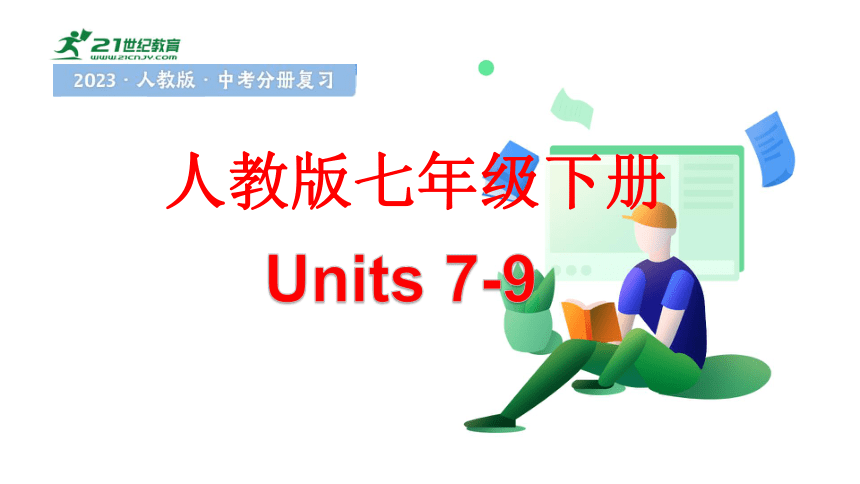 | |
| 格式 | pptx | ||
| 文件大小 | 1.7MB | ||
| 资源类型 | 试卷 | ||
| 版本资源 | 人教新目标(Go for it)版 | ||
| 科目 | 英语 | ||
| 更新时间 | 2023-02-26 11:12:11 | ||
图片预览

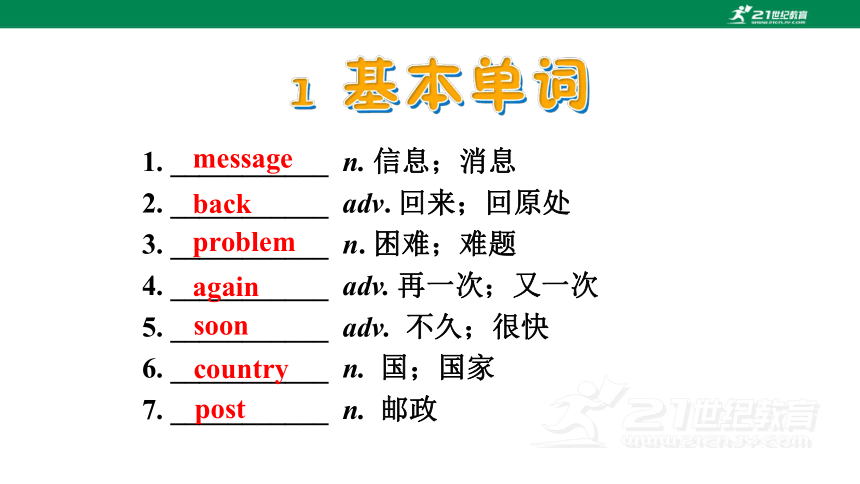
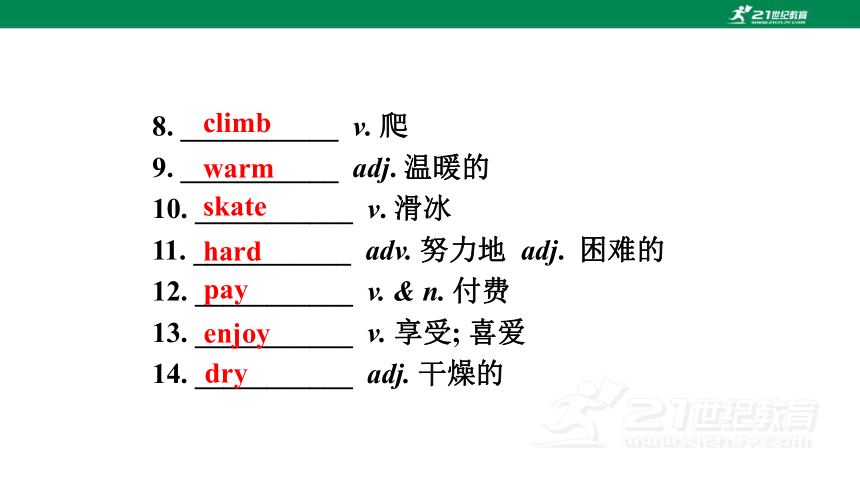
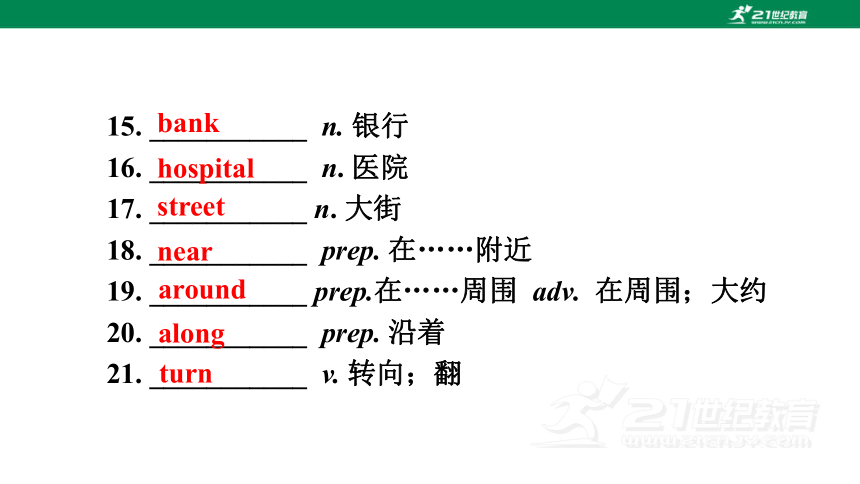
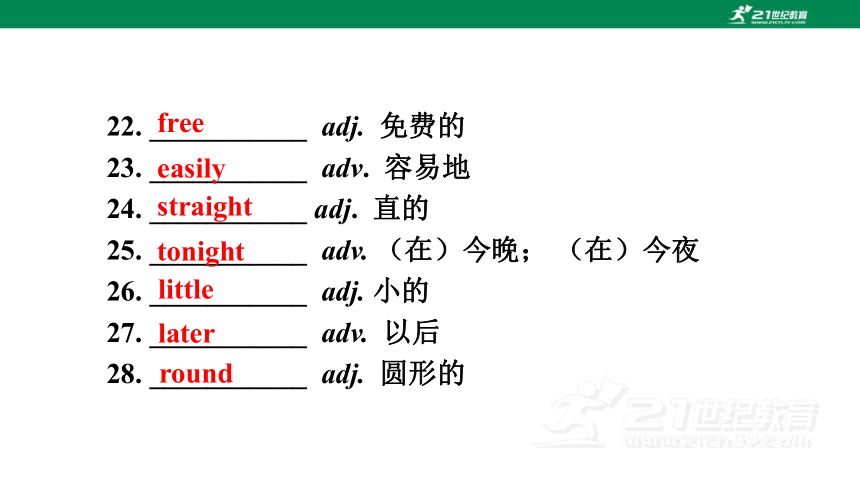
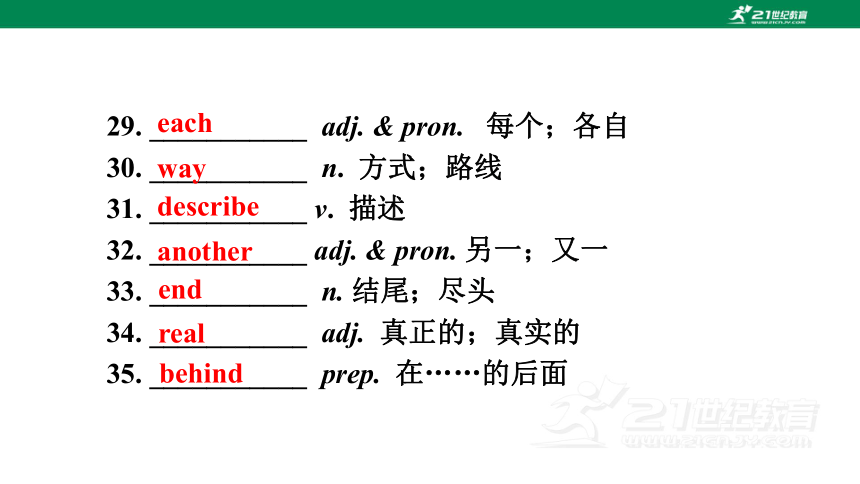
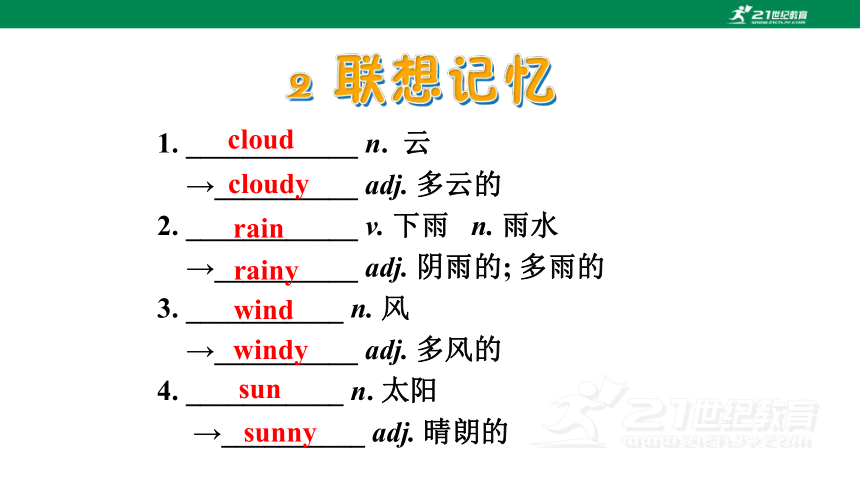
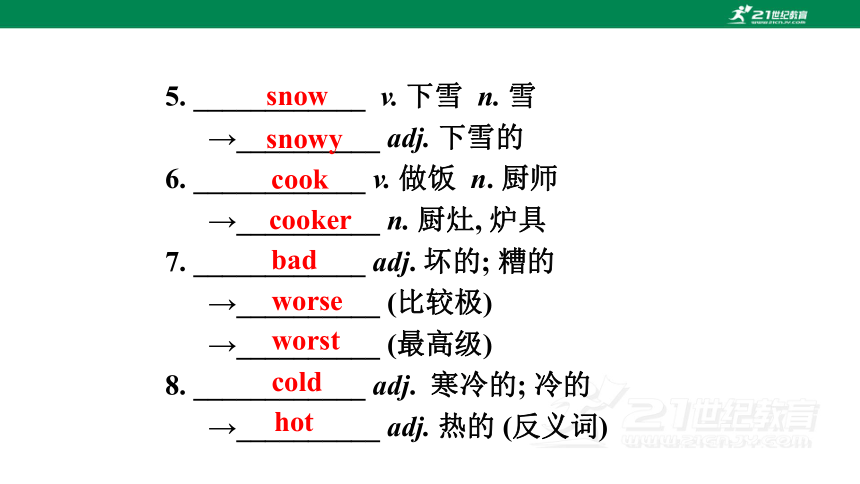
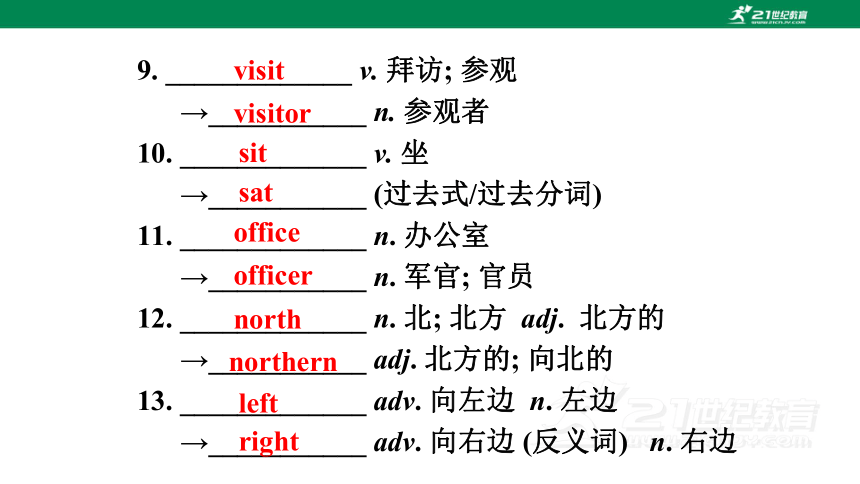
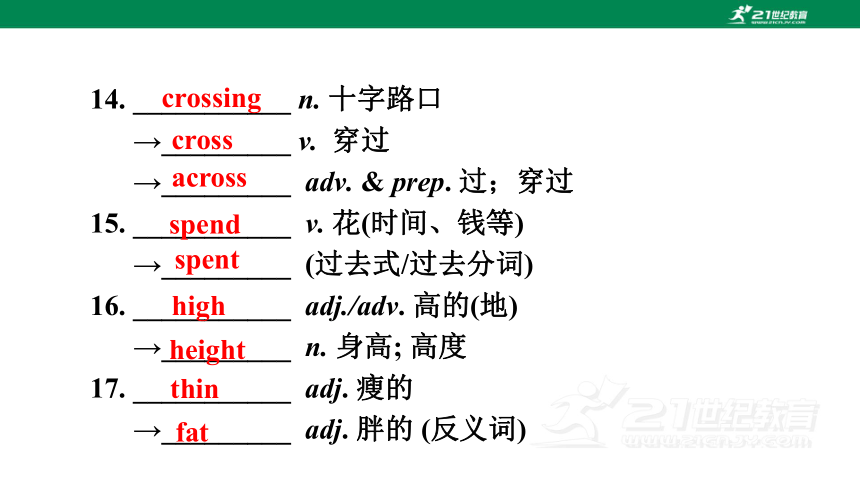
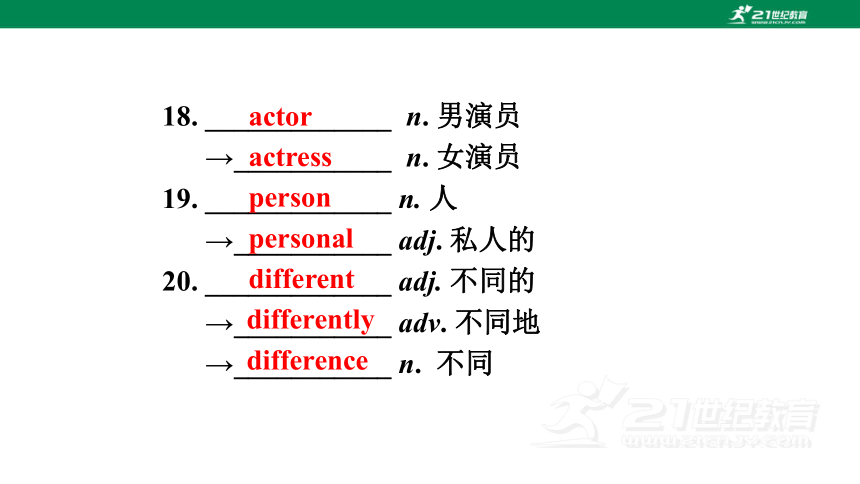
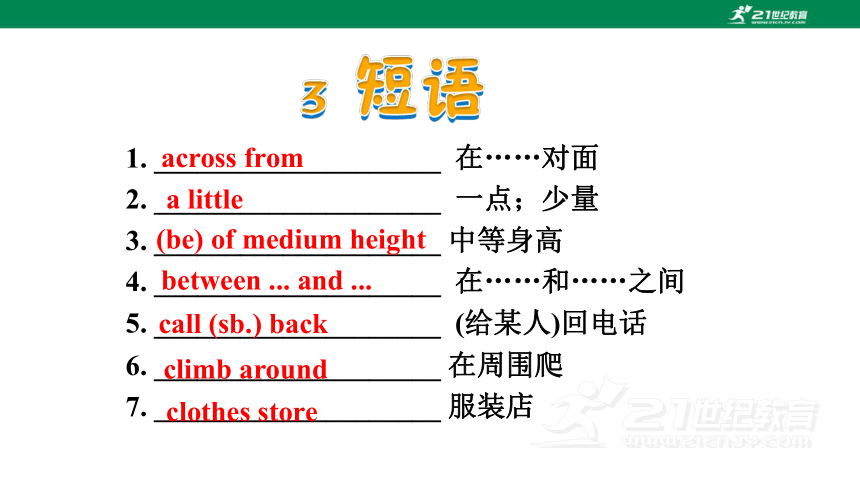
文档简介
(共99张PPT)
Units 7-9
人教版七年级下册
1. ___________ n. 信息;消息
2. ___________ adv. 回来;回原处
3. ___________ n. 困难;难题
4. ___________ adv. 再一次;又一次
5. ___________ adv. 不久;很快
6. ___________ n. 国;国家
7. ___________ n. 邮政
message
back
problem
again
soon
country
post
8. ___________ v. 爬
9. ___________ adj. 温暖的
10. ___________ v. 滑冰
11. ___________ adv. 努力地 adj. 困难的
12. ___________ v. & n. 付费
13. ___________ v. 享受; 喜爱
14. ___________ adj. 干燥的
climb
warm
skate
hard
pay
enjoy
dry
15. ___________ n. 银行
16. ___________ n. 医院
17. ___________ n. 大街
18. ___________ prep. 在……附近
19. ___________ prep.在……周围 adv. 在周围;大约
20. ___________ prep. 沿着
21. ___________ v. 转向;翻
bank
hospital
street
near
around
along
turn
22. ___________ adj. 免费的
23. ___________ adv. 容易地
24. ___________ adj. 直的
25. ___________ adv. (在)今晚; (在)今夜
26. ___________ adj. 小的
27. ___________ adv. 以后
28. ___________ adj. 圆形的
free
easily
straight
tonight
little
later
round
29. ___________ adj. & pron. 每个;各自
30. ___________ n. 方式;路线
31. ___________ v. 描述
32. ___________ adj. & pron. 另一;又一
33. ___________ n. 结尾;尽头
34. ___________ adj. 真正的;真实的
35. ___________ prep. 在……的后面
each
way
describe
another
end
real
behind
1. ____________ n. 云
→__________ adj. 多云的
2. ____________ v. 下雨 n. 雨水
→__________ adj. 阴雨的; 多雨的
3. ___________ n. 风
→__________ adj. 多风的
4. ___________ n. 太阳
→__________ adj. 晴朗的
cloud
rain
wind
cloudy
rainy
windy
sun
sunny
5. ____________ v. 下雪 n. 雪
→__________ adj. 下雪的
6. ____________ v. 做饭 n. 厨师
→__________ n. 厨灶, 炉具
7. ____________ adj. 坏的; 糟的
→__________ (比较极)
→__________ (最高级)
8. ____________ adj. 寒冷的; 冷的
→__________ adj. 热的 (反义词)
snow
cook
snowy
cooker
bad
worse
worst
cold
hot
9. _____________ v. 拜访; 参观
→___________ n. 参观者
10. _____________ v. 坐
→___________ (过去式/过去分词)
11. _____________ n. 办公室
→___________ n. 军官; 官员
12. _____________ n. 北; 北方 adj. 北方的
→___________ adj. 北方的; 向北的
13. _____________ adv. 向左边 n. 左边
→___________ adv. 向右边 (反义词) n. 右边
visit
sit
visitor
sat
office
officer
north
northern
left
right
14. ___________ n. 十字路口
→_________ v. 穿过
→_________ adv. & prep. 过;穿过
15. ___________ v. 花(时间、钱等)
→_________ (过去式/过去分词)
16. ___________ adj./adv. 高的(地)
→_________ n. 身高; 高度
17. ___________ adj. 瘦的
→_________ adj. 胖的 (反义词)
crossing
cross
across
spend
high
height
spent
thin
fat
18. _____________ n. 男演员
→___________ n. 女演员
19. _____________ n. 人
→___________ adj. 私人的
20. _____________ adj. 不同的
→___________ adv. 不同地
→___________ n. 不同
actor
actress
different
person
personal
differently
difference
1. ____________________ 在……对面
2. ____________________ 一点;少量
3. ____________________ 中等身高
4. ____________________ 在……和……之间
5. ____________________ (给某人)回电话
6. ____________________ 在周围爬
7. ____________________ 服装店
across from
a little
(be) of medium height
between ... and ...
call (sb.) back
clothes store
climb around
8. _______________________ 画某人 / 某物的照片
9. _______________________ 喝橙汁
10. ______________________ 喜欢阅读
11. ______________________ 在公园锻炼
12. ______________________ 沿着(这条街)走
13. ______________________________ 做某事很开心
14. ______________________ 有一张长/圆脸
enjoy reading
go along (the street)
have a good / great time doing sth.
draw a picture of sb./sth.
drink orange juice
exercise at the park
have a long/round face
15. _____________________________ 留着黑色的/金黄色的/棕
色的头发
16. _____________________________ 留着卷 / 直发
17. ___________________ 留着长 / 短发
18. ____________________ 有一些空闲时间
19. ____________________ 在……前面
20. ____________________ 玩得愉快
21. ____________________ 最后
22. ____________________ 在下雨天
in front of
in the end
have fun
in the rainy weather
have black / blonde / brown hair
have curly/straight hair
have long/short hair
have some free time
23. __________________ 以相同的方式
24. __________________ 看起来像
25. __________________ 度假
26. __________________ 在左 / 右边
27. __________________ 付费电话
28. __________________ 警察局
29. __________________ 邮局
30. __________________ 此刻;马上
look like
on (a) vacation
on the left / right
pay phone
police station
post office
right now
in the same way
31. ______________________ 花时间做某事
32. ______________________ 捎个口信;传话
33. ______________________ 第一个十字路口
34. ______________________ 向左 / 右转
35. ______________________ 戴眼镜
36. ______________________ 给某人写信
spend time (in) doing sth.
take a message
the first crossing
turn left / right
wear glasses
write to sb.
1. — How’s the weather / What’s the weather like
— It’s cloudy / raining.
— 天气怎么样?
— 多云 / 正在下雨。
2. —What is / are ... doing
— ... is / are ...
— ……正在做什么?
— ……正在……
3. — How’s it going
— Great! / Not bad. / Terrible!
— 近来可好?
— 很好!/ 不错。/ 很糟!
4. ... am / is / are having a good / great time doing sth.
……正在高兴地做某事。
5. — Is / Are there ... near here
— Yes, there is / are. / No, there isn’t / aren’t.
— 这附近有……吗?
— 是的,有。/ 不,没有。
6. — Where is / are the ...
— It’s / They’re ...
— ……在哪儿?
— 它 / 它们在……
7. — What do / does ... look like
— ... is / are thin. / ... has / have a big nose.
— ……长什么样?
— ……瘦。/ ……长着一个大鼻子。
8. — Is / Are ... tall or short
— ... is / are tall.
— ……高还是矮?
— ……高。
1. across adv. & prep. 过; 穿过
across / cross / through
across prep. 从……表面穿过,或横穿 主要表示从物体的表面上穿过。 across from 在……对面
cross v. 横过;越过 过马路、过河等。相当于go across
through prep. 穿过 主要表示从物体内部穿过。
1) The traffic light is green. Let' s go the road. (2022江苏连云港中考)
A. against B. among C. across D. above
C
2) 根据所给汉语提示完成句子 (2021甘肃武威)
书店在超市的对面。
The book store is _______ ______ the supermarket.
across from
They are building a bridge ______(cross) the river.
across
3) 根据句意用括号内所给单词的适当形式填空。(2020甘肃武威)
4) — Shall I help you ______ the street, Grandpa
— No, thanks. I can manage it myself. (2019河南)
A. on B. with C. across D. along
C
2. spend v. 花(时间、金钱等)
spend / pay / cost / take
spend sb. spend(s) time / money on sth.
某人在某事上花费时间/金钱
sb. spend(s) time / money (in) doing sth.
某人花费时间/金钱做某事
pay sb. pay(s) some money for sth. 某人为某物而付款
sb. pay (s) for sth. 某人为某物值钱,赔偿
cost sth. cost(s) (sb.) some money 某物花费(某人)多少钱
take It takes sb. some time to do sth. 某人花费多长时间做某事
【语境应用】根据句意用take, spend, pay或cost的适当形式填空。
1) This coat is very nice, but it ________ too much.
2) She ________ much money on her clothes.
3) It ________ us an hour to walk to the park yesterday.
4) How much did you ________ for these things
costs
spends
took
pay
1) 将下列句子译成英语。(2022江苏扬州中考)
我希望今年暑假我们能和朋友共度更多的时光。
I hope we can spend more time with our friends this summer vacation/ holiday.
2) 完成句子。(2022广西贺州中考)
You’d better spend more time __________ sports after school to keep healthy.
doing
3) Jim, you’d better not ________ too much time on your mobile phone. (2021江苏连云港中考)
A. cost B. spend C. take D. pay
B
4) It _____ Zhang Guimei many years to help about 1, 800 girls students in poor areas realize their college dreams. (2021黑龙江龙东中考)
A. took B. spent C. cost
A
5) — How did you come to Baoying
— By high-speed rail. It _______ me only 28 minutes to get here. (2021江苏扬州中考)
A. spent B. paid C. lost D. took
D
6) 句型转换。按括号内的要求转换下列句型。(每空限填一词)
(2021甘肃天水)
I spent an hour at the station waiting for the train. (改为同义句)
It _______me an hour _______wait for the train at the station.
took to
7) 完成句子(2020 湖北孝感)
在夜市,人们可以花更少的钱买到他们想要的东面。
At night markets,people can__________ __________ money on what they want.
spend less
8) 根据所给汉语和句子意思,用英语补全句子。(2019江苏连云港)
Yesterday afternoon my brother ___________________________ (花了两个小时安装) a new light in our bedroom.
spent two hours (in) putting in
3. enjoy v. 享受; 喜爱
enjoy v.
enjoy sth. 喜欢某物,后接名词或代词作宾语
enjoy doing sth. 喜欢做某事,后接动名词作宾语
enjoy oneself = have a good time/ have fun 玩的高兴
跟动名词作宾语
+ doing sth.
enjoy
mind
practice
avoid
consider
喜欢做某事
介意做某事
练习做某事
避免做某事
考虑做某事
keep
继续做某事
1) 根据下列句子及所给汉语注释,写出空缺处各单词的正确形式(每空一词)。(2022浙江宁波中考)
Cathy enjoys __________ (解决) a problem by sharing it with her best friends.
solving
2) 根据首字母提示补全单词,使句子完整、通顺。每空一词。
( 2022新疆中考)
They are such interesting books that we all enjoy r______ them.
reading
3) 完成句子。 (2021江苏扬州中考)
Jack enjoys _____________ and sunbathing with his friends. (游泳)
swimming
4) 完成句子。 (2021江苏宿迁中考)
Look! The children are enjoying ___________ (他们自己) in the playground. How happy they are!
themselves
5) 用括号内所给单词的适当形式填空,每空限填一词。(2021山东临沂中考)
Yesterday Alice tried paragliding and she enjoyed _________ very much. ( her )
herself
6) 完成句子。 (2021江苏南京)
Tony's sister enjoys __________ (listen) to music and she often goes to concerts.
listening
4. height n. 高度; 身高
表示长、宽、深的名词及对应的形容词:
long → length, wide → width, deep → depth
1) 根据首字母提示补全单词,使句子完整、通顺。每空一词。(2022新疆中考)
It is reported that the h______ of Qomolangma is more than 8844. 43 meters.
height
2) Only one word for each blank. (2021黑龙江龙东中考)
The _________ (high) of Qomolangma is 8, 848. 86 meters high now.
height
4) 根据所给汉语句子,把英语句子补充完整(每空填一个单词)。(2019山东烟台)
我们历史老师中等身高。他对我们很严格。
Our history teacher is of medium ______. He is very ______ with us.
height
strict
3) 根据中文提示,写出单词在句中的正确形式。(2020 四川宜宾)
China will announce the new_______(高度) of Mount Qomolangma.
height
5. singer n. 歌手
artist n. 艺术家
构词法:
动词+er = (人物)名词 名词+ist = (人物)名词
如: teach + er = teacher
play + er = player
piano + ist = pianist
violin + ist = violinist
2) 完成句子。(2021广西河池)
Lin Tao wants to be an _______ (艺术家)when he grows up.
singer
1) 根据句意,用括号中所给单词的正确形式填空。
(2021广西北部湾)
The young ________ (sing) surprised us all with her wonderful voice.
artist
3) 根据句意,用括号中所给单词的正确形式填空,每空一词。
(2020 江苏镇江)
My neighbour is a famous _______(sing) and she often does charity work.
singer
6. each adj. & pron. 每个; 各自
adv. 每一个
1) each作形容词修饰名词时, 名词用单数形式。
2) each作代词用时, 可与介词of 连用, 后加代词宾格或名词复数(名词前通常有物主代词、定冠词、指示代词等修饰成分); 作主语时, 其谓语动词必须用单数形式。
each/every
each 强调个体; 可用主语、同位语、宾语、定语
every 强调整体; 不能独立使用; 与not连用表示部分否定
1. in front of 在……前面
in front of / in the font of
in front of 在某个范围外部的前面, 其反义词为behind
in the font of 指在某个范围内部的前面, 其反义词组为at the back of
e.g. In the front of the classroom, Mr. Li is having a lesson in front of his students.
【语境应用】 根据句意从方框中选择恰当的词语填空。
1) Some cars are _____________ the classroom building.
2) There is a computer ______________ my classroom.
in front of, in the front of
in front of
in the front of
根据所给中文提示完成句子翻译。(2021辽宁鞍山中考)
在巨大的危险面前,他表现得很英勇。
He showed courage _____________________ great danger.
in face of / in front of
2. a little / little / a few / few
肯定意义 否定意义 所跟名词
a little 一点儿;少量 little 几乎没有 不可数名词
a few 少数的;一些;几个 few 几乎没有 可数名词复数
—Hurry up, or we will miss the school bus.
—Don't worry. We have _________time. (2022湖南郴州中考)
A. few B. little C. a little
2) Hurry up, Su Mei! The graduation ceremony begins in a second. We have _______ time left. (2022四川泸州中考)
A. few B. a few C. little D. a little
C
C
2) 改错。
Here are a little suggestions. (2019甘肃天水)
3) Father was so busy with his work that he had ________ time to read the newspaper. (2019甘肃武威、白银)
A. some B. little C. much D. a bit of
few
B
【语境应用】根据汉语提示,写出空缺处各单词的正确形式
1) Because of the COVID-19, only a few ________ (市场) were open in our city last spring. (2020 浙江宁波)
markets
4) Hurry up, _______ you will miss the flight. There is ______ time left. (2019 黑龙江龙东)
A. or; little
B. and; a little
C. or; a little
A
3. in the end 最后;终于
in the end / at the end of / by the end of
in the end “最后; 终于”, 相当于at last/finally, 后面不接of短语。
at the end of “在……的尽头; 在……的末端”, 后接时间或地点名词
by the end of “到……末”, 后接名词, 常与一般将来时或过去完成时连用。
【语境应用】用by the end of,in the end或at the end of填空。
1) We will have a physics exam ___________________ September.
2) The lady was so lucky that she found her lost son ___________________.
3) ___________________ the day we had sold over 1,000 pairs of shoes.
at the end of
in the end
By the end of
1. How’s the weather in Beijing
北京的天气怎么样
How’s the weather = What’s the weather like
How’s the weather in + 地点
某地的天气怎么样
答语:It is + 天气状况
【注意】
weather是不可数名词, 不能用a或 an修饰。
询问天气情况的常用表达方式还有:
What do you think of the weather
你认为天气怎么样
What will the weather be like tomorrow
明天天气怎么样?
【语境应用】汉译英。
—今天杭州的天气怎么样?
—很热。
— How’s the weather / What’s the weather like in Hangzhou
today
— It’s hot.
2. I’m having a great time visiting my aunt in Canada.
我正开心地拜访我在加拿大的姑姑。
have a great time (in) doing sth. = have fun (in) doing sth.
做某事很开心
fun前可用great, much, a lot of等修饰。
【拓展】
have trouble/problem(s) (in) doing sth.
在做某事方面有困难
3. --- What does she look like 她长什么样
--- She has long straight hair. 她留着长直发。
【归纳】
What does/do sb. look like
询问某人的外貌长相。
回答时常用描述外貌的形容词,用“主语+be动词+形容词”句式,也可用“主语+ have/has+形容词+名词”句式描述。
【温馨提示】
What is / are ... like 常用来询问人的性格,某人是什么样的
人?”,like为介词,意为“像”。
e.g. —What’s he like
—He’s friendly / quiet.
What do/does sb. like 提问喜好,意为“某人喜欢什么?”,其中like为动词,意为“喜欢”。
e.g. —What does your brother like doing in his free time
—He likes playing football.
【语境应用】 根据答句及提示词语写出问句。
1) —____________________________ (his parents)
—They are very tall.
2) —______________________ (Lucy)
—She is a little shy.
What do his parents look like
What is Lucy like
There be 结构
一、句型结构
“There be +主语(某人或某物) +状语(某地或某时)”表示“某地或某时有某人或某物”。
二、动词be的形式
1. 时态的变化
There be结构有时态的变化。
一般现在时:There is / are ... 如:
There is a ruler on the desk.
一般过去时:There was / were ... 如:
There were many birds in our garden yesterday.
一般将来时:There is / are going to / will be ... 如:
There is going to / will be a basketball game in our school this afternoon.
现在完成时:There has / have been ... 如:
There have been thousands of people in the stadium.
2. 数的变化
当只有一个主语时,动词be在数上应与其后的主语保持一致,即语法一致原则。如:
There were two men in the store at that time.
There is an orange on the table.
当主语为并列主语时,可以根据第一个主语的单复数来确定be的形式,即就近一致原则。如:
There is a cup and two bowls on the table.
概念 形式
说话者提供两种或两种以上的情况, 供对方选择其一的疑问句 一般疑问句,选择项+or+选择项?
特殊疑问句,选择项+or+选择项?
选择疑问句
选择疑问句不用yes或no回答, 可用完整的陈述句或其简略形式作答,也可用不定代词all, either, neither或none作答, 只要根据实际情况回答即可。
1. —Is Mr. White leaving today or tomorrow
—He is leaving tomorrow. / Tomorrow.
2. —Do you want tea or coffee
—I want coffee. / Coffee.
3. —Shall we go home or stay here tonight
—We shall go home. / Go home.
4. —Which would you like, water or juice
—I’d like juice. / Juice.
2. There ________ some milk and several apples in the fridge. (2022湖北恩施中考)
A. is B. are C. be
1. — There ____ a talk by Zhong Nanshan in our school tomorrow afternoon.
— Great We can't wait! (2022 广西贵港中考)
A. is B was C. will be D. will have
C
A
3. In our school library, there__________ a number of books on art. The number of the books__________ still growing larger and larger. (2022贵州黔东南中考)
A. is; is B. are; is C. is; are D. are; are
B
4. — A pandemic(疫情) broke out in Shaoyang last month.
— Yeah. ______ were so many doctors and nurses coming to help us. (2022湖南邵阳中考)
A. They B. There C. Those
B
5. 根据中文意思,补全英语译文。(每空限填一词,缩写算一词) (2022贵州贵阳中考)
有许多像大数据一样无形的“桥”连接着贵州与世界。
______ _____ many invisible bridges like Big Data connecting Guizhou and the world.
There are
6. 根据汉语提示,用句末括号内的英语单词完成句子。
(2021湖北荆州中考)
_____________ and some books on the desk.
桌子上有一支钢笔和一些书。(be)
There is a pen
7. 翻译(2021辽宁铁岭、葫芦岛中考)
这附近有一家电影院。
There is a cinema near here/around here/in the neighborhood.
8. 翻译。(2021山东威海)
威海今年下了很多雨。
There is / has been a lot of/lots of/plenty of/so much rain in Weihai this year.
9. 连词成句 (2021河北)
games, there were, fun, lots of
There were lots of fun games.
10. 阅读下面的材料,在空白处填入适当的内容(1个单词)或括号内单词的正确形式(1个或几个单词),使句子通顺正确。 (2021湖南常德中考)
— I'm hungry, mum.
—There ______ some bread on the table. Remember to wash your hands.
is
一、社会交往
(Social communications)
谈论天气(Talking about weather)
*A: What’s the weather like today
B: It’s a nice / fine / beautiful day today.
*A: How’s the weather in London
B: It’s sunny / cloudy / windy / rainy / snowy / foggy.
*A: What a cool day today! / How cool it is today!
B: Yes, but it’s getting hot later on.
*A: How’s the weather tomorrow
B: It’s going to rain / snow.
*A: It’s snowing / raining, isn’t it
B: Yes. And it’s snowing / raining really heavily.
二、空间(Space)
位置(Position)
The supermarket is across from / opposite the park.
The bank is in front of the pay phone.
The restaurant is on the left / right of the high school.
*A: Where’s my pencil box
B: It’s on the sofa / in your schoolbag / under the table.
*A: Where’s the hotel
B: It’s behind the police station / next to / near the post office / between the post office and the library.
三、存在(Existence)
存在与不存在
(Existence and non-existence)
*A: Is there a hospital near here
B: Yes, there is. / No, there isn’t.
*A: What’s in the schoolbag
B: There are some books and a dictionary.
There aren’t any pictures on the bedroom wall.
【写作任务】每个人都生活在一个特定的环境。请以“What I like about where I live”为题,并根据以下要点和要求用英语写一篇短文,描述你的生活环境。
1. 要点:1) 你生活在什么样的环境;
2) 你喜欢这个环境的什么;
3) 你对这个环境有何期望。
2. 要求:1) 文中不得出现真实姓名和学校名称;2) 词数80左右。
居住环境——社区
【思路点拨】
1. 定基调
体裁:说明文
时态:一般现在时
人称:以第一人称和第三人称为主
2. 谋布局、写句子
It’s convenient to go anywhere I’d like to
I can take a walk or do exercise here after a busy day
A library with millions of books is in front of the supermarket / There is a library with millions of books in front of the supermarket
3. 巧衔接
① 介绍社区周边设施时,可以使用near, on the right of, across from, in front of这些表示方位的词,使文章条理,同时也给读者呈现出一个清晰的立体方位图,使读者印象深刻。
② 介绍完居住地优点时,要引出新的话题(存在的问题)时,可以用however来承上启下;当列举问题时,可以用for example来举例说明。
4. 成篇章
What I like about where I live
______________________________________________________________________________________________________________________________________________________________________________
______________________________________________________________________________________________________________________________________________________________________________
____________________________________________________________________________________________________________________
I live in a big and beautiful community which lies in the center of the city. It’s convenient to go anywhere I’d like to. And that is what I like most about my community. Also, I like the environment around here. Near my community, there is a big park where I can enjoy fresh air and clean water. I can take a walk or do exercise here after a busy day. On the right of the park is a five-star hotel with the best service. Across from the hotel, you can see a big supermarket.
_______________________________________________________________________________________________________________________________________________________________________________________________________________________________________________________________________________________________________________________________________________________________________________________________________________
It sells all kinds of safe vegetables and fresh fruit. A library with millions of books is in front of the supermarket. When I am free, I prefer to stay there as much as possible.
However, there are some problems here. For example, roads are narrow and cars are parked here and there, so there is always heavy traffic. If roads are wider and there are more parking lots, the traffic will be better.
5. 化“平凡”为“非凡”
① Across from the hotel, you can see a big supermarket. It sells all kinds of safe vegetables and fresh fruit.
→Across from the hotel is a big supermarket which sells all kinds of safe vegetables and fresh fruit.
② If roads are wider and there are more parking lots, the traffic will be better.
→If roads are widened and more parking lots built, the traffic will be better.
Ⅰ. 根据语境及所给汉语提示,写出所缺单词。
1. Linda often _______(拜访) her grandparents on the weekend.
2. —How about some _______(果汁)
—OK, I like it.
3. It’s a beautiful place with a big river and some ___________ (高山).
4. Peter’s father likes _______________(滑冰) best of all sports.
visits
juice
mountains
skating / to skate
Ⅰ. 从方框中选择合适的单词填空,使每个句子在结构、句意和逻辑上正确。
1. Eric lives to the _______ of his school.
2. Look at those _________. They are playing in the tree.
3. At that cinema, children under 12 can watch a movie for _______ from Monday to Friday.
4. The math homework is not difficult. I can finish it _______.
5. I like the clean _______ after the snow.
6. Frank is helping an old man cross the _______.
monkey, air, easy, road, north, free
north
monkeys
free
easily
air
road
7. I don’t know the ________ of the story.
8. In our class, ________ girl has a red skirt.
9. The tea is good. I want to have ________ cup.
10. She never has any ________ friends at school.
11. Do you know the ________ to the train station
each
end
another
real
way
each, way, another, end, real
Ⅱ. 根据汉语意思,完成英语句子,每空一词。
1. 你的暑假有多长?
How long is your _______ _______
2. Lisa正在给她爸爸写信。
Lisa _______ _______ _______ her father.
3. 能帮助你我感到很高兴。
I’m _______ _______ _______ you.
summer vacation
is writing to
happy to help
4. 我能给这些动物拍照吗?
Can I _______ ______________ _______ these animals
5. 看! John和他的朋友们在一起打篮球,玩得很开心。
Look! John _______ _______ _______ _______ basketball with his friends.
take photos / pictures of
is having fun playing
6. 你们街区有付费电话吗?
Are there any ______ ______ ______ ______ _____________
7. 千万不能花钱如流水。
Don’ t _______ _______ like water.
8. 为了到那个村庄,我们不得不过那条河。
_______ _______ _______ that village, we _______ _______ _______ the river.
pay phones in your neighborhood
spend money
To get to have to
cross
9. 时间过得真快,我必须走了。
_______ _______ ________. I must go.
10. Henry看起来像他的妈妈。
Henry _______ _______ his mother.
11. 你能告诉我你的新朋友长什么样吗?
Can you tell me _________ your new friend _________ _________
Time goes quickly
looks like
what looks
like
12. 你们为何不把它登在报纸上?
Why don’t you _________ it _________ __________
13. 你可以给我画张像吗?
Can you _________ _________ _________ _________ me
14. 首先,告诉我你的名字。
_________ _________ _________, tell me your name.
15. Jeff和Jim最后和解了。
Jeff and Jim made up _________ _________ _________.
put in newspapers
draw a picture of
First of all
in the end
16. 不要同时讲话。
Don’t speak _________ _________ _________ _________.
17. 我妹妹喜欢穿牛仔裤。
My sister likes to _________ _________.
18. 罪犯是个又高又胖的老头。
The criminal is a(n) ________ and ________ ________ man.
at the same time
wear jeans
tall heavy old
Ⅲ. 根据括号内的要求完成下列各题,每空一词(含缩略形式)。
1. There are some students in the classroom. (改为否定句)
There _______ _______ students in the classroom.
2. There is a cat on the chair. (改为一般疑问句)
_______ _______ a cat on the chair
3. Four oranges are in the box. (改为同义句)
_______ _______ four oranges in the box.
aren’t any
Is there
There are
4. The bank is next to the hotel. (对划线部分提问)
________ the bank
5. —Are there any apples on the tree (补全肯定答语)
—Yes, _______ _______.
Where’s
there are
Ⅳ. 根据要求完成下列各题,每空一词(含缩略形式)。
1. John has brown hair. (改为一般疑问句)
________ John ________ brown hair
2. Joe likes black and blue. (改为否定句)
Joe ________ like black ________blue.
3. His new friend is English. (用American改为选择疑问句)
________ his new friend English ________ ________
4. My sister is really thin. (对划线部分提问)
________ ________ your sister ________ ________
Does have
doesn’t or
Is or American
What does look like
1. 有几个人在门口等你。
________________________ waiting for you at the door. (2020 辽宁丹东)
2. 房间里有一台电脑吗?
_____________________ in the room
3. 昨天那个公园里的人不多。
_________________________ in that park yesterday.
Ⅴ.完成句子。
There are several people
Is there a computer
There weren’t many people
4. There ________(be) many things to enjoy about traveling, including the natural beauty and delicious food. (2019江苏南京)
5. There _______(be) a lot of rain here every year. (2019湖南常德)
are
is
Ⅵ.根据汉语意思及括号内所给提示语,将下列句子翻译成英语。
1. 这附近有警察局吗? (there be)
____________________________________________
2. 此刻Mr. Wang正在开会。 (right now)
____________________________________________
3. 你能在火车站接我吗? (could)
____________________________________________________
4. 请叫Mary给我回电话。 (call ... back)
____________________________________________
Is there a police station near / around here
Mr. Wang is having a meeting right now.
Could you meet me / pick me up at the train / railway station
Please tell / ask Mary to call me back.
5. 昨晚Annie在派对上跳舞很开心。(have a great time)
___________________________________________________
6. 最后,那个小女孩过上了幸福的生活。 (in the end)
____________________________________________
7. 你的新英语老师长什么样? (look like)
____________________________________________
8. 我正在看那些男孩打篮球。 (watch)
____________________________________________
Annie had a great time (in) dancing at the party last night.
In the end, that little girl lived a happy life.
What does your new English teacher look like
I’m watching those boys playing basketball.
9. Lisa很高兴和她表姐一起工作。 (be happy to)
____________________________________________
10. 孩子们在看书还是在看电视? (or)
___________________________________________
11. Paul每天花时间练习说英语。 (spend time)
___________________________________________________
12. 为了有一个好的生活环境,我们应该和污染作斗争。(To ...)
____________________________________________________
Lisa is very happy to work with her cousin.
Are the children reading books or watching TV
Paul spends time (in) practicing speaking English every day.
To have a good living environment, we should fight pollution.
Ⅶ. 根据对话内容,在空白处填入恰当的句子,使对话完整、通顺。
A: Hi, Helen. This is Lisa speaking. I’m calling from Shanghai.
B: From Shanghai (1)__________________________
A: For a week.
B: (2)________________________
A: I’m here on holiday.
B: (3)__________________________________________________
Is it sunny
A: No, it’s raining.
B: (4)________________________________________________
How long have you been there
What are you doing there
What’s the weather like (there) / How’s the weather (there)
Are you having a good / great / wonderful time (there)
A: No, I’m not. I’m having a bad time. You know, I don’t like rainy days at all.
B: I’m sorry to hear that. By the way, (5)_________________________________________________
A: Next Friday.
B: OK. See you then!
A: See you!
when are you coming back / when will you come back
Units 7-9
人教版七年级下册
1. ___________ n. 信息;消息
2. ___________ adv. 回来;回原处
3. ___________ n. 困难;难题
4. ___________ adv. 再一次;又一次
5. ___________ adv. 不久;很快
6. ___________ n. 国;国家
7. ___________ n. 邮政
message
back
problem
again
soon
country
post
8. ___________ v. 爬
9. ___________ adj. 温暖的
10. ___________ v. 滑冰
11. ___________ adv. 努力地 adj. 困难的
12. ___________ v. & n. 付费
13. ___________ v. 享受; 喜爱
14. ___________ adj. 干燥的
climb
warm
skate
hard
pay
enjoy
dry
15. ___________ n. 银行
16. ___________ n. 医院
17. ___________ n. 大街
18. ___________ prep. 在……附近
19. ___________ prep.在……周围 adv. 在周围;大约
20. ___________ prep. 沿着
21. ___________ v. 转向;翻
bank
hospital
street
near
around
along
turn
22. ___________ adj. 免费的
23. ___________ adv. 容易地
24. ___________ adj. 直的
25. ___________ adv. (在)今晚; (在)今夜
26. ___________ adj. 小的
27. ___________ adv. 以后
28. ___________ adj. 圆形的
free
easily
straight
tonight
little
later
round
29. ___________ adj. & pron. 每个;各自
30. ___________ n. 方式;路线
31. ___________ v. 描述
32. ___________ adj. & pron. 另一;又一
33. ___________ n. 结尾;尽头
34. ___________ adj. 真正的;真实的
35. ___________ prep. 在……的后面
each
way
describe
another
end
real
behind
1. ____________ n. 云
→__________ adj. 多云的
2. ____________ v. 下雨 n. 雨水
→__________ adj. 阴雨的; 多雨的
3. ___________ n. 风
→__________ adj. 多风的
4. ___________ n. 太阳
→__________ adj. 晴朗的
cloud
rain
wind
cloudy
rainy
windy
sun
sunny
5. ____________ v. 下雪 n. 雪
→__________ adj. 下雪的
6. ____________ v. 做饭 n. 厨师
→__________ n. 厨灶, 炉具
7. ____________ adj. 坏的; 糟的
→__________ (比较极)
→__________ (最高级)
8. ____________ adj. 寒冷的; 冷的
→__________ adj. 热的 (反义词)
snow
cook
snowy
cooker
bad
worse
worst
cold
hot
9. _____________ v. 拜访; 参观
→___________ n. 参观者
10. _____________ v. 坐
→___________ (过去式/过去分词)
11. _____________ n. 办公室
→___________ n. 军官; 官员
12. _____________ n. 北; 北方 adj. 北方的
→___________ adj. 北方的; 向北的
13. _____________ adv. 向左边 n. 左边
→___________ adv. 向右边 (反义词) n. 右边
visit
sit
visitor
sat
office
officer
north
northern
left
right
14. ___________ n. 十字路口
→_________ v. 穿过
→_________ adv. & prep. 过;穿过
15. ___________ v. 花(时间、钱等)
→_________ (过去式/过去分词)
16. ___________ adj./adv. 高的(地)
→_________ n. 身高; 高度
17. ___________ adj. 瘦的
→_________ adj. 胖的 (反义词)
crossing
cross
across
spend
high
height
spent
thin
fat
18. _____________ n. 男演员
→___________ n. 女演员
19. _____________ n. 人
→___________ adj. 私人的
20. _____________ adj. 不同的
→___________ adv. 不同地
→___________ n. 不同
actor
actress
different
person
personal
differently
difference
1. ____________________ 在……对面
2. ____________________ 一点;少量
3. ____________________ 中等身高
4. ____________________ 在……和……之间
5. ____________________ (给某人)回电话
6. ____________________ 在周围爬
7. ____________________ 服装店
across from
a little
(be) of medium height
between ... and ...
call (sb.) back
clothes store
climb around
8. _______________________ 画某人 / 某物的照片
9. _______________________ 喝橙汁
10. ______________________ 喜欢阅读
11. ______________________ 在公园锻炼
12. ______________________ 沿着(这条街)走
13. ______________________________ 做某事很开心
14. ______________________ 有一张长/圆脸
enjoy reading
go along (the street)
have a good / great time doing sth.
draw a picture of sb./sth.
drink orange juice
exercise at the park
have a long/round face
15. _____________________________ 留着黑色的/金黄色的/棕
色的头发
16. _____________________________ 留着卷 / 直发
17. ___________________ 留着长 / 短发
18. ____________________ 有一些空闲时间
19. ____________________ 在……前面
20. ____________________ 玩得愉快
21. ____________________ 最后
22. ____________________ 在下雨天
in front of
in the end
have fun
in the rainy weather
have black / blonde / brown hair
have curly/straight hair
have long/short hair
have some free time
23. __________________ 以相同的方式
24. __________________ 看起来像
25. __________________ 度假
26. __________________ 在左 / 右边
27. __________________ 付费电话
28. __________________ 警察局
29. __________________ 邮局
30. __________________ 此刻;马上
look like
on (a) vacation
on the left / right
pay phone
police station
post office
right now
in the same way
31. ______________________ 花时间做某事
32. ______________________ 捎个口信;传话
33. ______________________ 第一个十字路口
34. ______________________ 向左 / 右转
35. ______________________ 戴眼镜
36. ______________________ 给某人写信
spend time (in) doing sth.
take a message
the first crossing
turn left / right
wear glasses
write to sb.
1. — How’s the weather / What’s the weather like
— It’s cloudy / raining.
— 天气怎么样?
— 多云 / 正在下雨。
2. —What is / are ... doing
— ... is / are ...
— ……正在做什么?
— ……正在……
3. — How’s it going
— Great! / Not bad. / Terrible!
— 近来可好?
— 很好!/ 不错。/ 很糟!
4. ... am / is / are having a good / great time doing sth.
……正在高兴地做某事。
5. — Is / Are there ... near here
— Yes, there is / are. / No, there isn’t / aren’t.
— 这附近有……吗?
— 是的,有。/ 不,没有。
6. — Where is / are the ...
— It’s / They’re ...
— ……在哪儿?
— 它 / 它们在……
7. — What do / does ... look like
— ... is / are thin. / ... has / have a big nose.
— ……长什么样?
— ……瘦。/ ……长着一个大鼻子。
8. — Is / Are ... tall or short
— ... is / are tall.
— ……高还是矮?
— ……高。
1. across adv. & prep. 过; 穿过
across / cross / through
across prep. 从……表面穿过,或横穿 主要表示从物体的表面上穿过。 across from 在……对面
cross v. 横过;越过 过马路、过河等。相当于go across
through prep. 穿过 主要表示从物体内部穿过。
1) The traffic light is green. Let' s go the road. (2022江苏连云港中考)
A. against B. among C. across D. above
C
2) 根据所给汉语提示完成句子 (2021甘肃武威)
书店在超市的对面。
The book store is _______ ______ the supermarket.
across from
They are building a bridge ______(cross) the river.
across
3) 根据句意用括号内所给单词的适当形式填空。(2020甘肃武威)
4) — Shall I help you ______ the street, Grandpa
— No, thanks. I can manage it myself. (2019河南)
A. on B. with C. across D. along
C
2. spend v. 花(时间、金钱等)
spend / pay / cost / take
spend sb. spend(s) time / money on sth.
某人在某事上花费时间/金钱
sb. spend(s) time / money (in) doing sth.
某人花费时间/金钱做某事
pay sb. pay(s) some money for sth. 某人为某物而付款
sb. pay (s) for sth. 某人为某物值钱,赔偿
cost sth. cost(s) (sb.) some money 某物花费(某人)多少钱
take It takes sb. some time to do sth. 某人花费多长时间做某事
【语境应用】根据句意用take, spend, pay或cost的适当形式填空。
1) This coat is very nice, but it ________ too much.
2) She ________ much money on her clothes.
3) It ________ us an hour to walk to the park yesterday.
4) How much did you ________ for these things
costs
spends
took
pay
1) 将下列句子译成英语。(2022江苏扬州中考)
我希望今年暑假我们能和朋友共度更多的时光。
I hope we can spend more time with our friends this summer vacation/ holiday.
2) 完成句子。(2022广西贺州中考)
You’d better spend more time __________ sports after school to keep healthy.
doing
3) Jim, you’d better not ________ too much time on your mobile phone. (2021江苏连云港中考)
A. cost B. spend C. take D. pay
B
4) It _____ Zhang Guimei many years to help about 1, 800 girls students in poor areas realize their college dreams. (2021黑龙江龙东中考)
A. took B. spent C. cost
A
5) — How did you come to Baoying
— By high-speed rail. It _______ me only 28 minutes to get here. (2021江苏扬州中考)
A. spent B. paid C. lost D. took
D
6) 句型转换。按括号内的要求转换下列句型。(每空限填一词)
(2021甘肃天水)
I spent an hour at the station waiting for the train. (改为同义句)
It _______me an hour _______wait for the train at the station.
took to
7) 完成句子(2020 湖北孝感)
在夜市,人们可以花更少的钱买到他们想要的东面。
At night markets,people can__________ __________ money on what they want.
spend less
8) 根据所给汉语和句子意思,用英语补全句子。(2019江苏连云港)
Yesterday afternoon my brother ___________________________ (花了两个小时安装) a new light in our bedroom.
spent two hours (in) putting in
3. enjoy v. 享受; 喜爱
enjoy v.
enjoy sth. 喜欢某物,后接名词或代词作宾语
enjoy doing sth. 喜欢做某事,后接动名词作宾语
enjoy oneself = have a good time/ have fun 玩的高兴
跟动名词作宾语
+ doing sth.
enjoy
mind
practice
avoid
consider
喜欢做某事
介意做某事
练习做某事
避免做某事
考虑做某事
keep
继续做某事
1) 根据下列句子及所给汉语注释,写出空缺处各单词的正确形式(每空一词)。(2022浙江宁波中考)
Cathy enjoys __________ (解决) a problem by sharing it with her best friends.
solving
2) 根据首字母提示补全单词,使句子完整、通顺。每空一词。
( 2022新疆中考)
They are such interesting books that we all enjoy r______ them.
reading
3) 完成句子。 (2021江苏扬州中考)
Jack enjoys _____________ and sunbathing with his friends. (游泳)
swimming
4) 完成句子。 (2021江苏宿迁中考)
Look! The children are enjoying ___________ (他们自己) in the playground. How happy they are!
themselves
5) 用括号内所给单词的适当形式填空,每空限填一词。(2021山东临沂中考)
Yesterday Alice tried paragliding and she enjoyed _________ very much. ( her )
herself
6) 完成句子。 (2021江苏南京)
Tony's sister enjoys __________ (listen) to music and she often goes to concerts.
listening
4. height n. 高度; 身高
表示长、宽、深的名词及对应的形容词:
long → length, wide → width, deep → depth
1) 根据首字母提示补全单词,使句子完整、通顺。每空一词。(2022新疆中考)
It is reported that the h______ of Qomolangma is more than 8844. 43 meters.
height
2) Only one word for each blank. (2021黑龙江龙东中考)
The _________ (high) of Qomolangma is 8, 848. 86 meters high now.
height
4) 根据所给汉语句子,把英语句子补充完整(每空填一个单词)。(2019山东烟台)
我们历史老师中等身高。他对我们很严格。
Our history teacher is of medium ______. He is very ______ with us.
height
strict
3) 根据中文提示,写出单词在句中的正确形式。(2020 四川宜宾)
China will announce the new_______(高度) of Mount Qomolangma.
height
5. singer n. 歌手
artist n. 艺术家
构词法:
动词+er = (人物)名词 名词+ist = (人物)名词
如: teach + er = teacher
play + er = player
piano + ist = pianist
violin + ist = violinist
2) 完成句子。(2021广西河池)
Lin Tao wants to be an _______ (艺术家)when he grows up.
singer
1) 根据句意,用括号中所给单词的正确形式填空。
(2021广西北部湾)
The young ________ (sing) surprised us all with her wonderful voice.
artist
3) 根据句意,用括号中所给单词的正确形式填空,每空一词。
(2020 江苏镇江)
My neighbour is a famous _______(sing) and she often does charity work.
singer
6. each adj. & pron. 每个; 各自
adv. 每一个
1) each作形容词修饰名词时, 名词用单数形式。
2) each作代词用时, 可与介词of 连用, 后加代词宾格或名词复数(名词前通常有物主代词、定冠词、指示代词等修饰成分); 作主语时, 其谓语动词必须用单数形式。
each/every
each 强调个体; 可用主语、同位语、宾语、定语
every 强调整体; 不能独立使用; 与not连用表示部分否定
1. in front of 在……前面
in front of / in the font of
in front of 在某个范围外部的前面, 其反义词为behind
in the font of 指在某个范围内部的前面, 其反义词组为at the back of
e.g. In the front of the classroom, Mr. Li is having a lesson in front of his students.
【语境应用】 根据句意从方框中选择恰当的词语填空。
1) Some cars are _____________ the classroom building.
2) There is a computer ______________ my classroom.
in front of, in the front of
in front of
in the front of
根据所给中文提示完成句子翻译。(2021辽宁鞍山中考)
在巨大的危险面前,他表现得很英勇。
He showed courage _____________________ great danger.
in face of / in front of
2. a little / little / a few / few
肯定意义 否定意义 所跟名词
a little 一点儿;少量 little 几乎没有 不可数名词
a few 少数的;一些;几个 few 几乎没有 可数名词复数
—Hurry up, or we will miss the school bus.
—Don't worry. We have _________time. (2022湖南郴州中考)
A. few B. little C. a little
2) Hurry up, Su Mei! The graduation ceremony begins in a second. We have _______ time left. (2022四川泸州中考)
A. few B. a few C. little D. a little
C
C
2) 改错。
Here are a little suggestions. (2019甘肃天水)
3) Father was so busy with his work that he had ________ time to read the newspaper. (2019甘肃武威、白银)
A. some B. little C. much D. a bit of
few
B
【语境应用】根据汉语提示,写出空缺处各单词的正确形式
1) Because of the COVID-19, only a few ________ (市场) were open in our city last spring. (2020 浙江宁波)
markets
4) Hurry up, _______ you will miss the flight. There is ______ time left. (2019 黑龙江龙东)
A. or; little
B. and; a little
C. or; a little
A
3. in the end 最后;终于
in the end / at the end of / by the end of
in the end “最后; 终于”, 相当于at last/finally, 后面不接of短语。
at the end of “在……的尽头; 在……的末端”, 后接时间或地点名词
by the end of “到……末”, 后接名词, 常与一般将来时或过去完成时连用。
【语境应用】用by the end of,in the end或at the end of填空。
1) We will have a physics exam ___________________ September.
2) The lady was so lucky that she found her lost son ___________________.
3) ___________________ the day we had sold over 1,000 pairs of shoes.
at the end of
in the end
By the end of
1. How’s the weather in Beijing
北京的天气怎么样
How’s the weather = What’s the weather like
How’s the weather in + 地点
某地的天气怎么样
答语:It is + 天气状况
【注意】
weather是不可数名词, 不能用a或 an修饰。
询问天气情况的常用表达方式还有:
What do you think of the weather
你认为天气怎么样
What will the weather be like tomorrow
明天天气怎么样?
【语境应用】汉译英。
—今天杭州的天气怎么样?
—很热。
— How’s the weather / What’s the weather like in Hangzhou
today
— It’s hot.
2. I’m having a great time visiting my aunt in Canada.
我正开心地拜访我在加拿大的姑姑。
have a great time (in) doing sth. = have fun (in) doing sth.
做某事很开心
fun前可用great, much, a lot of等修饰。
【拓展】
have trouble/problem(s) (in) doing sth.
在做某事方面有困难
3. --- What does she look like 她长什么样
--- She has long straight hair. 她留着长直发。
【归纳】
What does/do sb. look like
询问某人的外貌长相。
回答时常用描述外貌的形容词,用“主语+be动词+形容词”句式,也可用“主语+ have/has+形容词+名词”句式描述。
【温馨提示】
What is / are ... like 常用来询问人的性格,某人是什么样的
人?”,like为介词,意为“像”。
e.g. —What’s he like
—He’s friendly / quiet.
What do/does sb. like 提问喜好,意为“某人喜欢什么?”,其中like为动词,意为“喜欢”。
e.g. —What does your brother like doing in his free time
—He likes playing football.
【语境应用】 根据答句及提示词语写出问句。
1) —____________________________ (his parents)
—They are very tall.
2) —______________________ (Lucy)
—She is a little shy.
What do his parents look like
What is Lucy like
There be 结构
一、句型结构
“There be +主语(某人或某物) +状语(某地或某时)”表示“某地或某时有某人或某物”。
二、动词be的形式
1. 时态的变化
There be结构有时态的变化。
一般现在时:There is / are ... 如:
There is a ruler on the desk.
一般过去时:There was / were ... 如:
There were many birds in our garden yesterday.
一般将来时:There is / are going to / will be ... 如:
There is going to / will be a basketball game in our school this afternoon.
现在完成时:There has / have been ... 如:
There have been thousands of people in the stadium.
2. 数的变化
当只有一个主语时,动词be在数上应与其后的主语保持一致,即语法一致原则。如:
There were two men in the store at that time.
There is an orange on the table.
当主语为并列主语时,可以根据第一个主语的单复数来确定be的形式,即就近一致原则。如:
There is a cup and two bowls on the table.
概念 形式
说话者提供两种或两种以上的情况, 供对方选择其一的疑问句 一般疑问句,选择项+or+选择项?
特殊疑问句,选择项+or+选择项?
选择疑问句
选择疑问句不用yes或no回答, 可用完整的陈述句或其简略形式作答,也可用不定代词all, either, neither或none作答, 只要根据实际情况回答即可。
1. —Is Mr. White leaving today or tomorrow
—He is leaving tomorrow. / Tomorrow.
2. —Do you want tea or coffee
—I want coffee. / Coffee.
3. —Shall we go home or stay here tonight
—We shall go home. / Go home.
4. —Which would you like, water or juice
—I’d like juice. / Juice.
2. There ________ some milk and several apples in the fridge. (2022湖北恩施中考)
A. is B. are C. be
1. — There ____ a talk by Zhong Nanshan in our school tomorrow afternoon.
— Great We can't wait! (2022 广西贵港中考)
A. is B was C. will be D. will have
C
A
3. In our school library, there__________ a number of books on art. The number of the books__________ still growing larger and larger. (2022贵州黔东南中考)
A. is; is B. are; is C. is; are D. are; are
B
4. — A pandemic(疫情) broke out in Shaoyang last month.
— Yeah. ______ were so many doctors and nurses coming to help us. (2022湖南邵阳中考)
A. They B. There C. Those
B
5. 根据中文意思,补全英语译文。(每空限填一词,缩写算一词) (2022贵州贵阳中考)
有许多像大数据一样无形的“桥”连接着贵州与世界。
______ _____ many invisible bridges like Big Data connecting Guizhou and the world.
There are
6. 根据汉语提示,用句末括号内的英语单词完成句子。
(2021湖北荆州中考)
_____________ and some books on the desk.
桌子上有一支钢笔和一些书。(be)
There is a pen
7. 翻译(2021辽宁铁岭、葫芦岛中考)
这附近有一家电影院。
There is a cinema near here/around here/in the neighborhood.
8. 翻译。(2021山东威海)
威海今年下了很多雨。
There is / has been a lot of/lots of/plenty of/so much rain in Weihai this year.
9. 连词成句 (2021河北)
games, there were, fun, lots of
There were lots of fun games.
10. 阅读下面的材料,在空白处填入适当的内容(1个单词)或括号内单词的正确形式(1个或几个单词),使句子通顺正确。 (2021湖南常德中考)
— I'm hungry, mum.
—There ______ some bread on the table. Remember to wash your hands.
is
一、社会交往
(Social communications)
谈论天气(Talking about weather)
*A: What’s the weather like today
B: It’s a nice / fine / beautiful day today.
*A: How’s the weather in London
B: It’s sunny / cloudy / windy / rainy / snowy / foggy.
*A: What a cool day today! / How cool it is today!
B: Yes, but it’s getting hot later on.
*A: How’s the weather tomorrow
B: It’s going to rain / snow.
*A: It’s snowing / raining, isn’t it
B: Yes. And it’s snowing / raining really heavily.
二、空间(Space)
位置(Position)
The supermarket is across from / opposite the park.
The bank is in front of the pay phone.
The restaurant is on the left / right of the high school.
*A: Where’s my pencil box
B: It’s on the sofa / in your schoolbag / under the table.
*A: Where’s the hotel
B: It’s behind the police station / next to / near the post office / between the post office and the library.
三、存在(Existence)
存在与不存在
(Existence and non-existence)
*A: Is there a hospital near here
B: Yes, there is. / No, there isn’t.
*A: What’s in the schoolbag
B: There are some books and a dictionary.
There aren’t any pictures on the bedroom wall.
【写作任务】每个人都生活在一个特定的环境。请以“What I like about where I live”为题,并根据以下要点和要求用英语写一篇短文,描述你的生活环境。
1. 要点:1) 你生活在什么样的环境;
2) 你喜欢这个环境的什么;
3) 你对这个环境有何期望。
2. 要求:1) 文中不得出现真实姓名和学校名称;2) 词数80左右。
居住环境——社区
【思路点拨】
1. 定基调
体裁:说明文
时态:一般现在时
人称:以第一人称和第三人称为主
2. 谋布局、写句子
It’s convenient to go anywhere I’d like to
I can take a walk or do exercise here after a busy day
A library with millions of books is in front of the supermarket / There is a library with millions of books in front of the supermarket
3. 巧衔接
① 介绍社区周边设施时,可以使用near, on the right of, across from, in front of这些表示方位的词,使文章条理,同时也给读者呈现出一个清晰的立体方位图,使读者印象深刻。
② 介绍完居住地优点时,要引出新的话题(存在的问题)时,可以用however来承上启下;当列举问题时,可以用for example来举例说明。
4. 成篇章
What I like about where I live
______________________________________________________________________________________________________________________________________________________________________________
______________________________________________________________________________________________________________________________________________________________________________
____________________________________________________________________________________________________________________
I live in a big and beautiful community which lies in the center of the city. It’s convenient to go anywhere I’d like to. And that is what I like most about my community. Also, I like the environment around here. Near my community, there is a big park where I can enjoy fresh air and clean water. I can take a walk or do exercise here after a busy day. On the right of the park is a five-star hotel with the best service. Across from the hotel, you can see a big supermarket.
_______________________________________________________________________________________________________________________________________________________________________________________________________________________________________________________________________________________________________________________________________________________________________________________________________________
It sells all kinds of safe vegetables and fresh fruit. A library with millions of books is in front of the supermarket. When I am free, I prefer to stay there as much as possible.
However, there are some problems here. For example, roads are narrow and cars are parked here and there, so there is always heavy traffic. If roads are wider and there are more parking lots, the traffic will be better.
5. 化“平凡”为“非凡”
① Across from the hotel, you can see a big supermarket. It sells all kinds of safe vegetables and fresh fruit.
→Across from the hotel is a big supermarket which sells all kinds of safe vegetables and fresh fruit.
② If roads are wider and there are more parking lots, the traffic will be better.
→If roads are widened and more parking lots built, the traffic will be better.
Ⅰ. 根据语境及所给汉语提示,写出所缺单词。
1. Linda often _______(拜访) her grandparents on the weekend.
2. —How about some _______(果汁)
—OK, I like it.
3. It’s a beautiful place with a big river and some ___________ (高山).
4. Peter’s father likes _______________(滑冰) best of all sports.
visits
juice
mountains
skating / to skate
Ⅰ. 从方框中选择合适的单词填空,使每个句子在结构、句意和逻辑上正确。
1. Eric lives to the _______ of his school.
2. Look at those _________. They are playing in the tree.
3. At that cinema, children under 12 can watch a movie for _______ from Monday to Friday.
4. The math homework is not difficult. I can finish it _______.
5. I like the clean _______ after the snow.
6. Frank is helping an old man cross the _______.
monkey, air, easy, road, north, free
north
monkeys
free
easily
air
road
7. I don’t know the ________ of the story.
8. In our class, ________ girl has a red skirt.
9. The tea is good. I want to have ________ cup.
10. She never has any ________ friends at school.
11. Do you know the ________ to the train station
each
end
another
real
way
each, way, another, end, real
Ⅱ. 根据汉语意思,完成英语句子,每空一词。
1. 你的暑假有多长?
How long is your _______ _______
2. Lisa正在给她爸爸写信。
Lisa _______ _______ _______ her father.
3. 能帮助你我感到很高兴。
I’m _______ _______ _______ you.
summer vacation
is writing to
happy to help
4. 我能给这些动物拍照吗?
Can I _______ ______________ _______ these animals
5. 看! John和他的朋友们在一起打篮球,玩得很开心。
Look! John _______ _______ _______ _______ basketball with his friends.
take photos / pictures of
is having fun playing
6. 你们街区有付费电话吗?
Are there any ______ ______ ______ ______ _____________
7. 千万不能花钱如流水。
Don’ t _______ _______ like water.
8. 为了到那个村庄,我们不得不过那条河。
_______ _______ _______ that village, we _______ _______ _______ the river.
pay phones in your neighborhood
spend money
To get to have to
cross
9. 时间过得真快,我必须走了。
_______ _______ ________. I must go.
10. Henry看起来像他的妈妈。
Henry _______ _______ his mother.
11. 你能告诉我你的新朋友长什么样吗?
Can you tell me _________ your new friend _________ _________
Time goes quickly
looks like
what looks
like
12. 你们为何不把它登在报纸上?
Why don’t you _________ it _________ __________
13. 你可以给我画张像吗?
Can you _________ _________ _________ _________ me
14. 首先,告诉我你的名字。
_________ _________ _________, tell me your name.
15. Jeff和Jim最后和解了。
Jeff and Jim made up _________ _________ _________.
put in newspapers
draw a picture of
First of all
in the end
16. 不要同时讲话。
Don’t speak _________ _________ _________ _________.
17. 我妹妹喜欢穿牛仔裤。
My sister likes to _________ _________.
18. 罪犯是个又高又胖的老头。
The criminal is a(n) ________ and ________ ________ man.
at the same time
wear jeans
tall heavy old
Ⅲ. 根据括号内的要求完成下列各题,每空一词(含缩略形式)。
1. There are some students in the classroom. (改为否定句)
There _______ _______ students in the classroom.
2. There is a cat on the chair. (改为一般疑问句)
_______ _______ a cat on the chair
3. Four oranges are in the box. (改为同义句)
_______ _______ four oranges in the box.
aren’t any
Is there
There are
4. The bank is next to the hotel. (对划线部分提问)
________ the bank
5. —Are there any apples on the tree (补全肯定答语)
—Yes, _______ _______.
Where’s
there are
Ⅳ. 根据要求完成下列各题,每空一词(含缩略形式)。
1. John has brown hair. (改为一般疑问句)
________ John ________ brown hair
2. Joe likes black and blue. (改为否定句)
Joe ________ like black ________blue.
3. His new friend is English. (用American改为选择疑问句)
________ his new friend English ________ ________
4. My sister is really thin. (对划线部分提问)
________ ________ your sister ________ ________
Does have
doesn’t or
Is or American
What does look like
1. 有几个人在门口等你。
________________________ waiting for you at the door. (2020 辽宁丹东)
2. 房间里有一台电脑吗?
_____________________ in the room
3. 昨天那个公园里的人不多。
_________________________ in that park yesterday.
Ⅴ.完成句子。
There are several people
Is there a computer
There weren’t many people
4. There ________(be) many things to enjoy about traveling, including the natural beauty and delicious food. (2019江苏南京)
5. There _______(be) a lot of rain here every year. (2019湖南常德)
are
is
Ⅵ.根据汉语意思及括号内所给提示语,将下列句子翻译成英语。
1. 这附近有警察局吗? (there be)
____________________________________________
2. 此刻Mr. Wang正在开会。 (right now)
____________________________________________
3. 你能在火车站接我吗? (could)
____________________________________________________
4. 请叫Mary给我回电话。 (call ... back)
____________________________________________
Is there a police station near / around here
Mr. Wang is having a meeting right now.
Could you meet me / pick me up at the train / railway station
Please tell / ask Mary to call me back.
5. 昨晚Annie在派对上跳舞很开心。(have a great time)
___________________________________________________
6. 最后,那个小女孩过上了幸福的生活。 (in the end)
____________________________________________
7. 你的新英语老师长什么样? (look like)
____________________________________________
8. 我正在看那些男孩打篮球。 (watch)
____________________________________________
Annie had a great time (in) dancing at the party last night.
In the end, that little girl lived a happy life.
What does your new English teacher look like
I’m watching those boys playing basketball.
9. Lisa很高兴和她表姐一起工作。 (be happy to)
____________________________________________
10. 孩子们在看书还是在看电视? (or)
___________________________________________
11. Paul每天花时间练习说英语。 (spend time)
___________________________________________________
12. 为了有一个好的生活环境,我们应该和污染作斗争。(To ...)
____________________________________________________
Lisa is very happy to work with her cousin.
Are the children reading books or watching TV
Paul spends time (in) practicing speaking English every day.
To have a good living environment, we should fight pollution.
Ⅶ. 根据对话内容,在空白处填入恰当的句子,使对话完整、通顺。
A: Hi, Helen. This is Lisa speaking. I’m calling from Shanghai.
B: From Shanghai (1)__________________________
A: For a week.
B: (2)________________________
A: I’m here on holiday.
B: (3)__________________________________________________
Is it sunny
A: No, it’s raining.
B: (4)________________________________________________
How long have you been there
What are you doing there
What’s the weather like (there) / How’s the weather (there)
Are you having a good / great / wonderful time (there)
A: No, I’m not. I’m having a bad time. You know, I don’t like rainy days at all.
B: I’m sorry to hear that. By the way, (5)_________________________________________________
A: Next Friday.
B: OK. See you then!
A: See you!
when are you coming back / when will you come back
